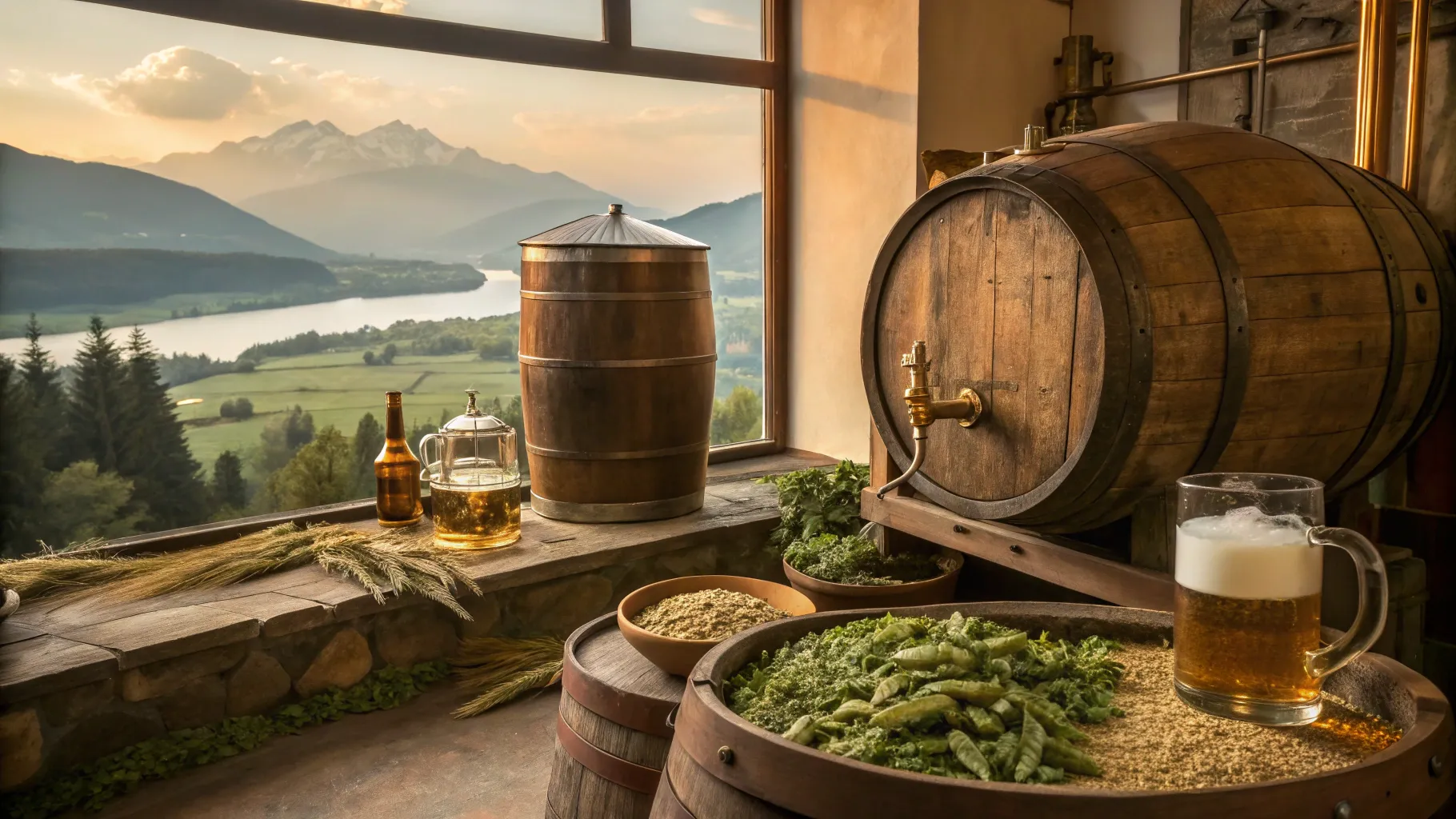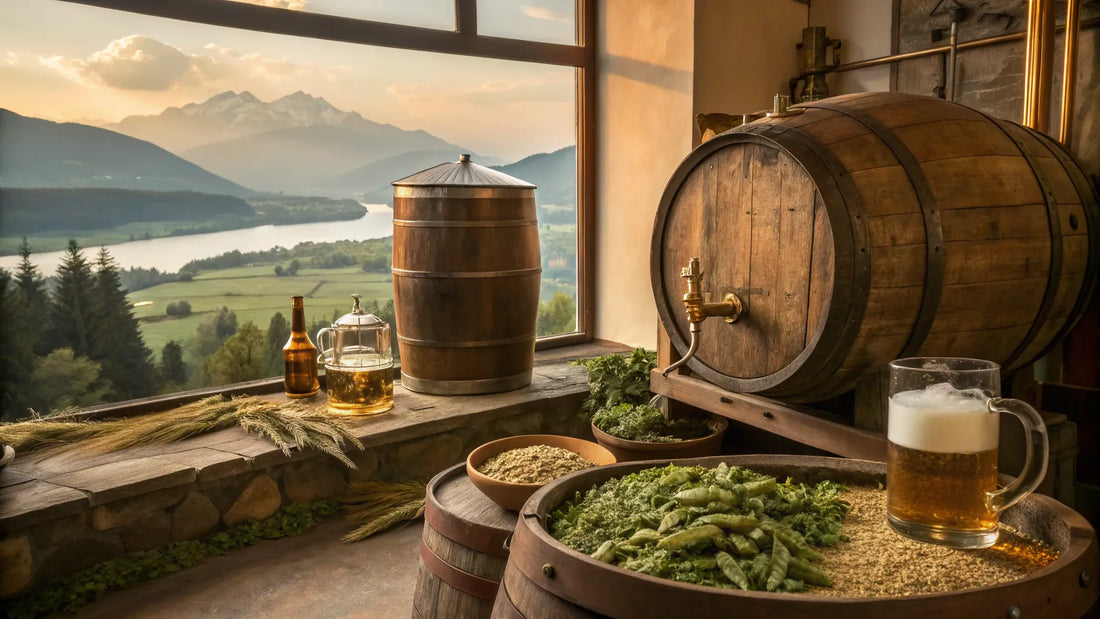The Impact of the Reinheitsgebot: 500 Years of Beer History

In this blog, we dive into the fascinating history of the Reinheitsgebot, the German purity law that has forever changed beer. From its origins in the 16th century to its current impact on beer culture, we discover why this law is so important for both local breweries and beer lovers worldwide.
What is the Reinheitsgebot? 🍺
The Reinheitsgebot, also known as the German Beer Purity Law, is a law that was introduced in 1516 to ensure the quality of beer. According to this law, only barley, hops, and water may be used in the brewing of beer. This means that no other ingredients, such as sugar or other grains, are allowed. The law is an important symbol of German beer culture and has influenced how beer is produced worldwide.
The purpose of the Reinheitsgebot was not only to ensure the quality of beer but also to protect public health. At that time, drinking water was often unsafe, making beer, which was heated during the brewing process, a safer alternative. The Reinheitsgebot ensured that consumers could trust the ingredients of their beer.
Important aspects of the Reinheitsgebot
- Quality Guarantee: The Reinheitsgebot guarantees that beer is made from high-quality ingredients.
- Public Health: By limiting ingredients, the risk of poisoning from harmful substances was reduced.
- Tradition: The law is an integral part of German beer culture and is still respected by many breweries.
The Origin of the Law 📜
The origin of the Reinheitsgebot dates back to the year 1516, when it was signed by Duke Wilhelm IV of Bavaria. The law was introduced during a time when the quality of beer varied greatly and many beers contained undesirable ingredients. By implementing this law, the duke aimed to improve the quality of beer in his country while also protecting the food supply.
The law was introduced during a time of economic and social changes. Farmers were dependent on their harvests and the quality of their products. By only allowing barley, hops, and water, competition among brewers became fairer and the use of cheaper, inferior ingredients was discouraged.
The impact of the law on beer production
The Reinheitsgebot has significantly influenced the German beer industry. It ensured that brewers focused on improving their product with the allowed ingredients. This led to innovations and the development of various beer styles that we still know today.
The Journey to Bavaria ✈️
Bavaria is the cradle of the Reinheitsgebot and forms a crucial part of German beer culture. The journey to Bavaria is not only a physical trip but also a cultural experience. Here, visitors can experience the origin of the Reinheitsgebot and discover the breweries that adhere to this law.
In Bavaria, there are countless breweries that apply the Reinheitsgebot. Many of these breweries are family businesses that have brewed beer for generations according to traditional methods. Visiting these breweries offers a unique opportunity to learn more about the history of beer and the impact of the Reinheitsgebot on the local community.
A look into the Bavarian breweries
- Family Traditions: Many breweries have been in the hands of the same families for hundreds of years.
- Cultural events: Bavarian breweries often organize festivals and events where visitors can enjoy local beers and traditional dishes.
- Educational tours: Many breweries offer tours where visitors can see the brewing process and learn more about the ingredients and techniques.
The History of the Wittelsbach Family 👑
The House of Wittelsbach has had a significant influence on the beer history in Bavaria. This royal family ruled over Bavaria from the 12th century until the end of the monarchy in 1918. Their involvement in beer production and the development of the Reinheitsgebot has left a lasting impression on the region.
Over the years, members of the Wittelsbach family have established and supported various breweries. Their commitment to the quality of beer and adherence to the Reinheitsgebot has contributed to Bavaria's reputation as one of the largest beer-producing regions in the world.
Important contributions of the Wittelsbachs to beer culture
- Oktoberfest: The largest beer festival in the world originated from a wedding celebration of a member of the Wittelsbach family.
- Brewing Development: The family has founded numerous breweries that have adhered to the Reinheitsgebot.
- Cultural impact: The Wittelsbachs have shaped the beer culture in Bavaria and continue to play an important role in local traditions.
The Role of Beer in Society 🍻
Beer plays a crucial role in Bavarian society. It is not just a drink, but also a social glue that brings communities together. From local festivals to family gatherings, beer is often the central element of social interaction.
In many villages and towns in Bavaria, it is customary to support local breweries. This not only strengthens the economy but also creates a strong bond between the residents and their beer tradition. Beer is more than a drink; it is a way of life.
Social significance of beer
- Sense of community: Beer connects people in social settings and promotes a feeling of togetherness.
- Tradition: Many Bavarian traditions are rooted in beer culture, such as celebrating harvest festivals and local events.
- Economic impact: The beer industry supports countless jobs and contributes to the local economy.
The Important Functions of the Reinheitsgebot ⚖️
The Reinheitsgebot fulfills several important functions within beer culture. It is not only a law but also a guarantee of quality and tradition. These functions contribute to the value and reputation of German beer, both nationally and internationally.
One of the main functions of the Reinheitsgebot is to ensure the quality of beer. By limiting ingredients, consumers can trust that they are getting a high-quality product. This has led to a strong reputation for German beer around the world.
Functions of the Reinheitsgebot
- Consumer protection: It protects consumers against harmful ingredients and ensures a safe product.
- Stimulating innovation: It forces brewers to be creative within the boundaries of the law, leading to new and interesting beer styles.
- Cultural identity: It strengthens the cultural identity of Germany and Bavaria, and emphasizes the value of traditional brewing methods.
The Original Legislation 📜
The legislation of the Reinheitsgebot, which was introduced in 1516, was a crucial moment in the history of beer production. Written at a time when the quality of beer varied greatly, this law ensured that only the best ingredients were used. The aim was not only to protect public health but also to ensure that the beer was reliable and safe for consumption.
By using barley, hops, and water as the only ingredients, the risk of poisoning from harmful substances was significantly reduced. This was an important step in ensuring the quality of beer at a time when knowledge about microbiology and food safety was still in its infancy.
Important elements of the law
- Protection of ingredients: The law established that only barley, hops, and water could be used in brewing beer, which protected the food supply.
- Consumer protection: By limiting ingredients, the risk of poisoning from the use of unsafe ingredients has been minimized.
- Establishment of prices: The law ensured that the prices of beer were established, so that consumers knew what to expect.
The Current Meaning of the Reinheitsgebot 💡
Today, the Reinheitsgebot is still of great importance to German beer culture. It serves as a guarantee for the quality and authenticity of German beer. Many breweries in Germany use the Reinheitsgebot as a marketing tool, emphasizing the purity of their products to attract consumers.
"This has led to a renewed appreciation for traditional brewing methods and the ingredients that have been used for centuries. The Reinheitsgebot not only influences the local market but also international breweries that strive to meet the high standards it represents."
Influence on global beer production
- International recognition: Many breweries outside Germany claim to brew according to the principles of the Reinheitsgebot, highlighting the global influence of this law.
- Consumer confidence: The Reinheitsgebot creates a sense of trust among consumers, who know they are purchasing a high-quality product.
- Revival of traditional styles: Due to the emphasis on pure ingredients, we see a revival of traditional beer styles that are based on the Reinheitsgebot.
The Innovations of Microbreweries 🍻
In recent years, microbreweries have experienced enormous growth and have shaken up the beer world. Although many microbreweries do not strictly adhere to the Reinheitsgebot, they have contributed to a thriving culture of creativity and innovation in beer production.
These breweries experiment with a wide range of ingredients and techniques, leading to unique and exciting beers. This has challenged the traditional beer culture and breathed new life into the way we experience beer.
The impact of microbreweries on beer culture
- Creativity: Microbreweries encourage brewers to experiment and develop new flavors and styles.
- Local involvement: Many microbreweries are strongly connected to their community, leading to a greater appreciation for local ingredients and traditions.
- Diversity in offerings: The rise of microbreweries has led to a wide range of beers, increasing the choice for consumers.
The Economic Impact of Beer 💰
Beer is not only a beloved drink, but also an important economic engine in Germany. The beer industry supports thousands of jobs and generates significant revenue for the local and national economy.
From breweries and cafes to festivals and events, the beer sector has a wide range of economic activities that contribute to the growth and development of the community.
Economic benefits of the beer industry
- Employment: The beer industry provides jobs for thousands of people, from brewers and distributors to employees in the hospitality sector.
- Tourism: Beer festivals and brewery tours attract millions of visitors each year, boosting the local economy.
- Tax Revenues: The sale of beer generates significant tax revenues for the government, which are then invested back into the community.
Beer and Culture: Oktoberfest 🎉
Oktoberfest is the largest beer festival in the world and an important cultural event in Germany. The festival, which originated in 1810, attracts millions of visitors from around the globe each year and celebrates the rich beer culture of Bavaria.
During Oktoberfest, traditional beers are served, and visitors can enjoy local dishes, music, and dance. This event strengthens the bond between beer and culture and highlights the role that beer plays in the social cohesion of the community.
Elements of Oktoberfest
- Traditional beers: Only beers that comply with the Reinheitsgebot and are from Munich are allowed at the festival.
- Cultural activities: In addition to beer, there are numerous cultural events, such as music performances and folk dances.
- Sense of community: Oktoberfest promotes a feeling of togetherness and community among visitors and participants.
The Change of Beer Laws ⚖️
Over the years, there have been various changes in beer laws, both in Germany and worldwide. While the Reinheitsgebot still plays an important role, modern breweries and consumers have developed new expectations and demands.
The rise of craft beers and innovations in brewing have led to discussions about the relevance of the Reinheitsgebot and the necessity to adapt the legislation to the present time.
Current challenges for beer laws
- Innovation vs. Tradition: The balance between preserving traditional brewing methods and embracing new techniques remains a challenge.
- Consumer Expectations: Consumers are increasingly looking for diversity and unique flavors, which puts pressure on traditional laws.
- International influences: The global beer culture influences the way we view beer laws and their significance.
The Current Brewery of Prince Leopold 🍻
Prince Leopold of Bavaria, a descendant of the Wittelsbach family, keeps the brewing tradition alive in his castle Kaltenberg. Here, various beers are brewed, including the famous Weissbier. His approach is a mix of respect for tradition and a focus on quality.
The brewery in Kaltenberg is not only a place for production but also a cultural hub. Visitors can enjoy tours and tastings, where they learn more about the history of brewing and the impact of the Reinheitsgebot. Prince Leopold emphasizes the necessity of ensuring the quality of German beers while also allowing room for creativity within the boundaries of the law.
Brewery specialties
- King Ludwig: A specialty that honors the rich history of dark beers.
- Weissbier: A traditional style brewed with the highest quality ingredients.
- Seasonal beers: Innovative beers that respond to local traditions and seasonal ingredients.
Tasting of the Prince's Beers 🍺
During a tasting of the beers from Prins Leopold, the diversity and quality of its products became clear. Each beer style has its own unique flavor profile, which is a reflection of the careful brewing processes and the pure ingredients used.
The tasting not only offered the chance to sample different beers, but also to learn about their origins and the history of brewing in the region. The prince's passion for beer and his commitment to quality made this experience special.
What to expect during a tasting
- Educational sessions: Learn more about the brewing process and the different ingredients used.
- Tastings: Enjoy a variety of beers, from light lagers to rich dark beers.
- Cultural insights: Discover the role of beer in Bavarian culture and traditions.
The Social Role of Beer 🍻
Beer is more than just a drink; it is an essential part of the social structure in Bavaria. It connects people and plays a crucial role in local traditions and celebrations. From village festivals to large events, beer is often the centerpiece of social interaction.
The value of beer in the community is undeniable. It is seen as a symbol of hospitality and togetherness. People come together to enjoy each other's company, often with a good glass of locally brewed beer in hand.
The impact of beer on the community
- Connecting people: Beer brings friends and family together, strengthens social ties, and fosters a sense of community.
- Traditional celebrations: Many local festivals and events revolve around beer, which contributes to the cultural identity of the region.
- Support for the local economy: Drinking locally brewed beer supports local breweries and stimulates the economy.
The Future of the Reinheitsgebot 🌍
The future of the Reinheitsgebot faces challenges. While it remains a symbol of quality and tradition, there are voices advocating for more flexibility in the legislation. The rise of microbreweries and new brewing techniques raises questions about the relevance of the law in the modern beer world.
Nevertheless, the Reinheitsgebot remains an important reference point for consumers seeking authentic and high-quality beer. The discussion about the future of the law will likely continue, but the fundamental principles of the Reinheitsgebot remain of great importance for beer culture in Germany and beyond.
Future developments
- Innovation within the law: There are opportunities to adjust the law to allow for creativity without losing the core principles.
- International influence: The global popularity of the Reinheitsgebot may lead to a broader acceptance of its principles outside Germany.
- Consumer awareness: A growing number of consumers demand transparency and quality, which reinforces the relevance of the Reinheitsgebot.





